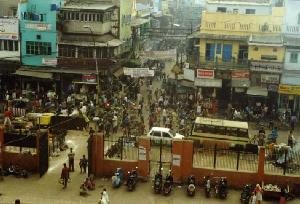|
Three Die Defending Polluting Industries NEW DELHI, India, November 22, 2000 (ENS) - Three people have been killed in violent protests in India's capital city of New Delhi. The four days of protests are against the court ordered closure of about 7,000 polluting industrial facilities. Thousands of angry owners and workers affected by the implementation of a November 14 Supreme Court order to close polluting industries operating from residential areas, have brought the city to a standstill. At least three persons were killed by police, and more than 100 sustained injuries in the violent clashes. Rampaging hordes blocked the streets, set government vehicles on fire and looted shops at various places in the city. Unrelenting, India's highest Court on Tuesday turned down a hasty request by the government of Delhi to allow it to slow down the process of shifting polluting and unauthorised industrial units in view of the chaos and violence. A three judge panel, including Justice B.N. Kripal, Justice N. Santosh Hegde and Justice Brijesh Kumar made it clear that orders of the court cannot be withdrawn because "hooligans have taken to the streets." Expressing "disgust" over the functioning of the Delhi government, the court lamented that the situation in the city is such that anybody could hold the city to ransom. The court said it ruled that the polluting industries be closed because "the health of the people is more important than the livelihood." The judges criticized the Delhi government, saying, "You created the situation as you deliberately disobeyed court orders and issued licences." The Supreme Court's November 14 order directing the closure of polluting industries in residential areas is really a reiteration of an old order made five years ago on which the last date of compliance had been put off three times from 1997 onwards. The court has issued a notice to Delhi's chief secretary requiring him to explain on November 28 why he should not be held in contempt of court for not complying with repeated orders to shut down the polluting industries. A similar notice was issued to the municipal commissioner of Delhi. Four days later the Delhi government issued a public notice against the polluting industries and began sealing all the industrial units located in residential areas. Of the 80,000 industrial units operating from within the metropolis, only about 30,000 have a valid licence. More than 125,000 workers were employed in these industries. They are likely to be unemployed since the government has not yet made alternate arrangements for relocating them. The chaos in Delhi has provided the perfect playing field for politicians. Soon after the protests began, Opposition leaders from the right-wing BJP held the chief minister Shiela Dixit who heads a Congress government in the state of Delhi, responsible for the problem as a result of unduly delays and lethargy. Dixit in turn blamed the earlier BJP governments for not adequately planning for the relocation of the industrial units in the Master Plan 2001. The political tempers were so high that the legislative State Assembly, which began its winter session Tuesday, had to be adjourned amidst unruly scenes. While the BJP members sat in a protest outside the Assembly demanding the resignation of the chief minister, the Congress members led a demonstration asking the removal of the Union minister for urban development, for ordering closure of the industrial units without first providing them with alternative sites. The Delhi government today buckled under public pressure and decided to amend and redefine household industries to allow certain industries to continue operating from residential areas. But the minister for urban development ruled out the possibility of any change in the master plan and said that efforts will be made to acquire more land for relocating and rehabilitating these industries outside the Capital city. With the battle now shifting to the political arena, New Delhi is relatively calm today with only a few road blocks and traffic snarls caused by protesters. .
|

